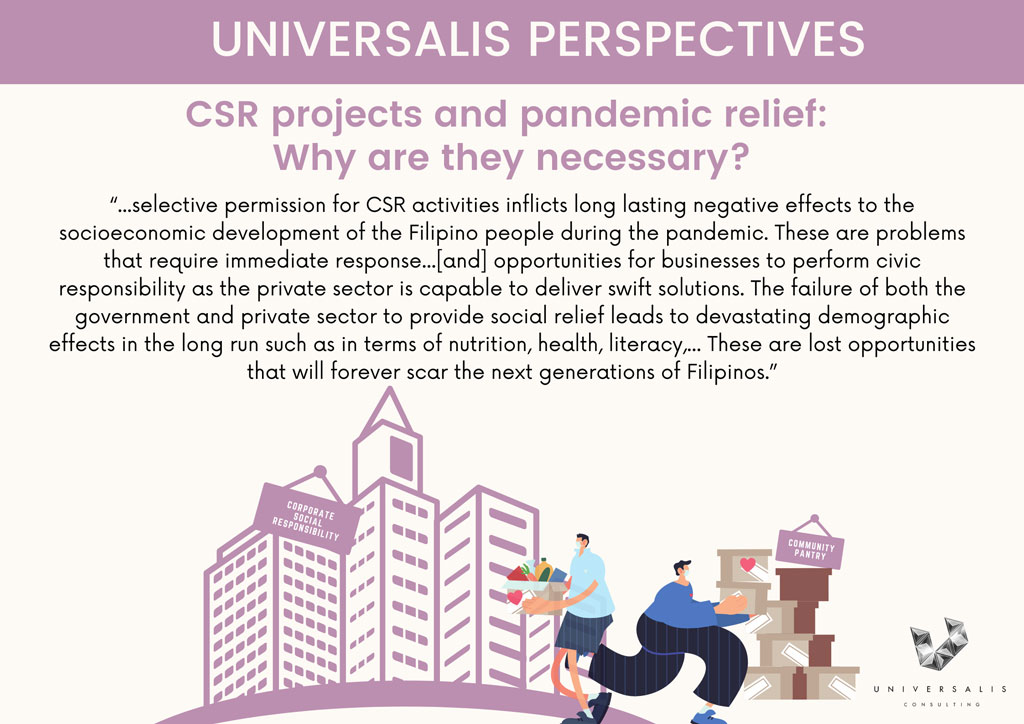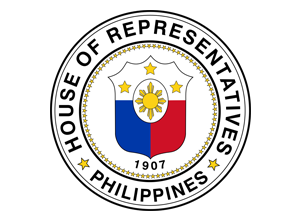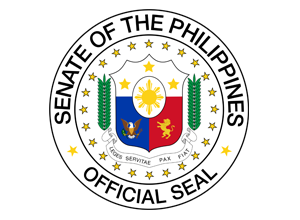Universalis Perspectives: CSR projects and pandemic relief: Why are they necessary?
On 30 January 2020, the House of Representatives collated a number of bills into a single version called House Bill (HB) No. 6137 or the “Corporate Social Responsibility Act” that proposes to provide incentives to businesses that will develop and implement corporate social responsibility (CSR) projects. Aside from being welcomed with optimism, the bill was also viewed as another way to tap the assistance of the private sector to assist the Philippine government in providing pandemic relief and executing post-pandemic economic recovery.
However, while such development presents opportunities for the country, certain sectors treat the proposal with skepticism. Specifically, they believe that CSR projects by some controversial industries may serve as strategies to convince lawmakers to alter or propose regulations that are favorable to their business operations. Among these are industries having stakes in environmental sustainability and public health. Such claim is not without basis as the Philippines is still steadfast in the implementation of archaic, restrictive laws that impede the private sector to perform its civic responsibility to the country.
Unfortunately, these restrictions have negative implications to the country’s development history. One aspect is the disconnect between these CSR restrictions and the social realities of the Philippines as a developing country. Unlike the developed states in the West, the rate of extreme poverty, malnutrition, hunger, and illiteracy in the Philippines is incomparable. In addition, these issues must not be only viewed as monolithic but has implications to the recurrence of vicious cycles that permit the existence of such severe socioeconomic underdevelopments. For instance, since poor parents need to provide the needs of their children, they are compelled to enter multiple job commitments to meet their monthly ends. Consequently, they can no longer provide the time and effort required to give their children a balanced diet, necessary medicines and supplements, and necessary guidance for health-related behaviors. Unfortunately, some laws restrict companies that can fill in these gaps in addressing the aforementioned underdevelopment issues.

Meanwhile, selective permission for CSR activities inflicts long lasting negative effects to the socioeconomic development of the Filipino people during the pandemic. As frequently stated, the economic toll of the pandemic extends to the individual well-being of every Filipinos especially those household who can no longer afford to provide food on their tables due to lack of employment opportunities. These are problems that require immediate response; however, due to various factors, the government response has been delayed. Consequently, these are opportunities for businesses to project civic responsibility since the private sector possesses the capabilities to deliver swift solutions. The failure of both the government and private sector to answer these needs of affected households leads to devastating demographic effects in the long term such as in terms of nutrition, health, quality of life, education and permanent illiteracy, and skill acquisition. These are lost opportunities that will forever scar the next Filipino generations.
In addition, it is lamentable to note that such restrictions are interpreted beyond the original spirit of the regulatory policy. One good example is the privilege speech of Sen. Francis Tolentino in which he used the case of the Milk Code and its revised implementing rules and regulations (RIRR) as examples of guidelines that overstretch what the original policy states. On the other hand, a leaked administrative order draft from the Department of Health last month stated that some industries are barred to procure COVID-19 vaccines on their own without any justification behind the wisdom of such provision. The issue gained traction as some senators decided to speak against the draft that compelled the DOH to withdraw the said guideline.
To be fair with these sectors, it is indeed important to acknowledge their fears and anxieties about the possible abuse of the proposed law on CSR incentivization. One premise that guides their suspicion is grounded on the idea that CSR initiatives may be used as an avenue not only to influence policy decision-making but also as spaces for brand marketing, promotion, and point-of-sale activities to influence public opinion, particularly consumer behavior concerning the legitimacy of their products, services and business operations. However, contrary to this conventional view, some studies challenge such assumption. Below are some studies that are tangential to this issue:
First, the relationship between CSR projects and positive consumer behavior is not a one-way process but a double-edged sword. In a study of Oh, Bae & Kim (2017) about the CSR expenditure of the so-called “sinful” industries (such as but not limited to tobacco, liquor, and gambling), they discovered that the risk of generating positive and negative perceptions in increased CSR activities of these industries are almost the same. Hence, it is important to understand the conditions behind the generation of favorable CSR-related perceptions.
Second, case studies from India and Italy also provide an alternative picture. For Chadhaury, Hurrah & Maqbool (2020), the consumers’ choice in India to patronize certain products is a mixed effect of three factors, namely, purchase intention, brand loyalty, and confidence that the firm is socially responsible. On the other hand, while Boccia, Manzo and Covino (2018) admitted that CSR projects of a firm have a positive correlation on increased consumer purchase, Italians still highly regard the price of a product as the main factor behind their purchasing intention and product consumption.
Lastly, Becker-Olsen, Cudmore & Hill (2005) casted light on what kind of CSR projects that successfully gains handle in influencing consumer behavior. In their study, CSR projects must consider the factor of fit which was defined as the “the perceived link between a cause and a product line, brand image, position and/or target market (p. 47)”. Based on their study, favorable consumer behavior is generated if CSR projects reflect high affinity between a corporate’s mission and their targeted social initiative.
Therefore, based on these points raised in this article, the government and the private sector must discern and internalize the following lessons. First, government officials and policymakers must reject their simplistic assumptions about the possibility of CSR projects to influence political outcomes, either directly or indirectly. As an implication, if the proposed CSR incentivization bill will be passed into law, the development of implementing rules and regulations must account into consideration how they will harmonize the intentions and goals of the government with the business interests of the firms they target to reward. Second, businesses aiming to obtain incentives and rewards from the government should account the lessons from the studies discussed in order to avoid scenarios that will erode the confidence of the public to the sincerity of these businesses’ CSR projects.


